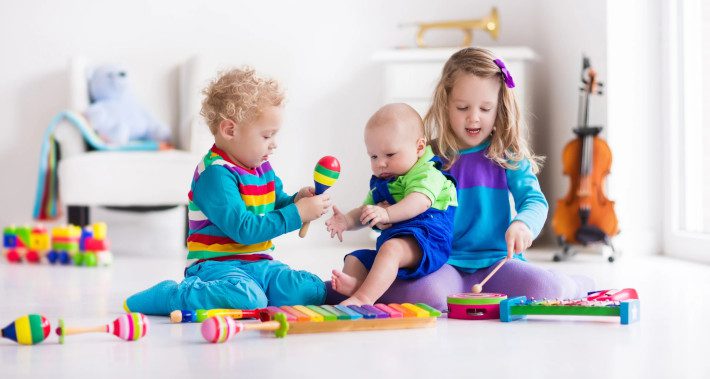
Why is music great for Early Learning?
Music is a priceless tool for teaching many skills including language and motor skills.
Singing children’s songs is a fun way to help children recognize and imitate new sounds and vocabulary in an interactive way that is simple to incorporate into your daily routine.
Music can help in the following ways:
Routine
Why not make singing part of your routine, which, in turn, can help your child understand his/her routine.
Singing the same song morning and night can help your child understand what will happen next (i.e., getting up to start the day versus winding down to go to sleep).
Singing a “hello” song at circle time or when meeting new friends can be great for little ones learning to greet others.
And teaching the “clean up” song can help children transition between activities.
By singing this song as an activity is coming to an end, your child has time to process the expectations that toys are being put away in order to move on.
Consistency is key here: the more you sing a song at a particular point, the more your child will understand the meaning and expectations associated with it.
Vocabulary
You can use songs to teach new sounds and new words.
For example, use “Old McDonald” to teach animal names and animal sounds or try “Head and Shoulders”, “Eyes, Nose, Cheeky, Cheeky, Chin”, or “If You’re Happy and You Know It” to teach body parts.
Try incorporating toys or visuals into your songs to further solidify these concepts!
Turn-Taking
Did you know that singing songs can also build turn-taking skills?
While singing together, your child learns to pay attention to your voice and actions and will later learn to copy what you are doing/saying.
Your child will take cues from the intonation in your voice or moments of silence and begin to understand that it is now his/her turn to move, make sounds, or sing part of the song.
Once your child is familiar with a song, provide opportunities to participate throughout by pausing and waiting to see if they will chime in.
If they don’t, you can cue them with hand-over hand support to make the gesture or start off the sound for them (e.g., “With a moo moo here and a mmmm….”).
Motor Skills
An added benefit to nursery rhymes and songs are the actions and signs that accompany them.
These actions can promote the practice of fine motor skills such as pointing, matching finger tips to finger tips, or touching your nose.
Likewise, they may promote gross motor skills such as stomping your feet or jumping up and down.
The actions in any song also assist in building coordination and memory (not to mention, burning off a little energy).
Teach your children the actions and gestures through repetition.
If your child is having difficulty learning or is reluctant, feel free to gently take their hands and do the actions with them.
After they become more comfortable with the gestures you can pause and wait, as mentioned above, to see if they will complete the action.
Or, you can be silly and perform the wrong action to see if your child will correct you.
Other benefits of singing songs with your child include building the following skills:
- Joint attention
- Listening skills
- Numeracy
- Rhyming
- Rhythm
- Memory
- Story telling
- Sequencing
- And more!
Some of our favourite songs include:
- Baa Baa Black Sheep
- The Wheels on the Bus
- Ring Around the Rosey
- Row Row Row Your Boat
- Teddy Teddy Bear
- Eyes, Nose, Cheeky Cheeky, Chin
- Twinkle Twinkle Little Star
- Clean Up Clean Up
- Round and Round the Garden
- Down by the Bay
- Baby Beluga
- Holiday songs and Christmas carols
Adjust to your Child and Have Fun!
If your child is interested in a particular subject – sing songs about that!
For example, if your child likes dinosaurs, why not make up your own version to “Old McDonald” about dinosaur sounds.
Or, if your child loves the rhythm of baby shark, why not come up with a fun song for that? (e.g., “Time for bath doo doo doo doo doo doo… time for jammies doo doo doo doo… time for book… time for sleep…”).
Above all, focus on getting face-to-face and having fun! As long as YOU are having fun, we bet your child will be too!
If you need us, we’ll be carolling 😉
372 Hollandview Trail, #302,
Aurora, ON L4G 0A5
(905) 503-4321
» https://goo.gl/maps/fg3XKnNsczzwLzTz7
Aurora Speech Clinic is located in Aurora, ON and offers personalized skilled intervention to those struggling with their speech and language skills. Services offered include screening, consultation, and comprehensive evaluation. We also provide one-on-one and/or group therapy for speech sound disorders, receptive/expressive language delay/disorder, stuttering/cluttering, accent reduction, and much more.